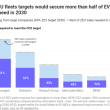Walmart has confirmed it will not meet its 2025 plastic packaging reduction and recyclability targets, marking another setback in its sustainability commitments. The announcement, published on 28 February, follows the retailer’s earlier admission that it would also miss its 2025 and 2030 greenhouse gas emissions reduction targets.
“While we have made significant progress towards our ambitious 2025 goals for recycled content, virgin plastic reduction, and packaging recyclability, we expect to fall short of achieving these goals by 2025,” Walmart stated in its update, which included data from the 2023 calendar year.
Despite efforts to increase post-consumer recycled (PCR) plastic use and improve packaging circularity, Walmart reported that its use of virgin plastic has risen, largely due to growth in food product categories. According to its reporting to the Ellen MacArthur Foundation, the retailer used nearly 1.07 million metric tonnes of virgin plastic in 2023. Walmart also stated that 82% of its global private-brand plastic packaging is designed for recycling.
The company attributed its struggles to factors beyond its control, including limited availability of high-quality PCR plastic, price volatility, regulatory restrictions on PCR use in sectors such as pharmaceuticals, and insufficient infrastructure to support recyclable and compostable materials.
“While we continue to work towards reducing waste, progress depends on many factors outside our control, including emergence and scalability of innovative more-recyclable materials, public policy for materials management systems, infrastructure development, and societal behaviour change,” Walmart stated.
Walmart remains a participant in the U.S. Plastics Pact, which last year extended most collective 2025 sustainability targets to 2030. These shared goals include reducing virgin plastic use by 30%, recycling half of all plastic packaging, increasing the average PCR or responsibly sourced biobased content across plastic packaging to 30%, and ensuring all plastic packaging is recyclable, reusable, or compostable.
Despite falling short of its 2025 targets, Walmart highlighted other waste reduction initiatives in its report. In 2023, the retailer replaced nearly all plastic mailers with paper alternatives and optimised cardboard box sizes to reduce e-commerce waste. It also introduced BPI-certified compostable single-use cutlery under its Great Value store brand. Additionally, Walmart is working to manage secondary packaging waste, which accounts for nearly three-quarters of its operational waste stream, through initiatives such as reusable containers and large-scale recycling of film and cardboard.
The retail sector has seen several companies reassess or delay their packaging sustainability goals in recent years, with 2025 having been a common deadline for major corporations.













